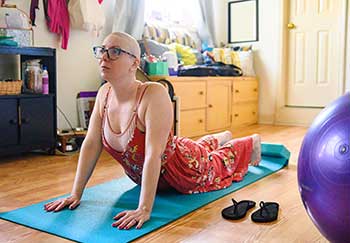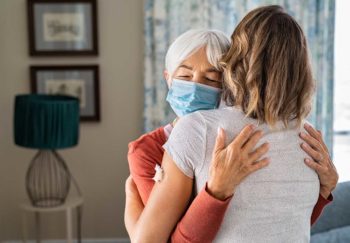
Immunocompromised. High risk. Underlying conditions. You hear these terms, but do you know if they include you? Some people who get infected with the coronavirus (COVID-19) have mild symptoms, if any. But people die from this disease, too. Why the drastic difference? What makes someone at a higher risk of dying from the coronavirus?
Some health conditions and medications make people more likely to get really sick from COVID-19. What puts them at higher risk of dying from the coronavirus?
When Your Defense is Down
Your immune system fights infections. Like the defensive players on a football team, your immune system tries to block the opposite team from getting to your territory. If you don’t have enough defensive players, or they’re all injured, they won’t have the energy to put up much of a fight. The other team will score, over and over.
This is what happens when you have a weakened immune system. The infecting virus faces little resistance. You get sicker than people with healthy immune systems.
Several things can weaken your immune system, including:
- Age
- Pregnancy
- Existing disease or illness
- Certain medications
Age & Pregnancy
Data shows that older people face a higher risk of getting coronavirus and dying from it.
Once you’re over 65, your immune system is weaker than it used to be. This is just a function of old age.
We don’t yet know if pregnant women have a higher risk for COVID-19. But we know pregnant mothers also have reduced immunity. Their bodies back down, as it were, to allow the new genes in the growing fetus.
Health Conditions That Weaken Your Immunity
Your body doesn’t have endless resources. If you’re waiting for an organ transplant, for instance, you probably have a disease you’re fighting already. Adding the coronavirus infection just taxes your system even more.
If you have liver or kidney disease, or you’re on dialysis, a similar principle is at play. Defending against COVID-19 can strain your liver and kidneys. Your body is overworked and not able to put all its forces together for effective protection.
Diabetes also dampens the immune system. It causes inflammation, which makes a person more vulnerable to infection. So far, people with diabetes who become infected with COVID-19 suffer worse outcomes.
If you have diabetes, keeping your blood sugar under control will help you survive a coronavirus infection.
When a Disease Directly Attacks the Immune System
If you’re living with HIV and managing it well with your antiretroviral therapy (ART), you don’t have a higher risk of getting coronavirus.
But if you’re not taking your ART regularly? Or at all? Then your risk goes through the roof. The HIV virus attacks the immune system. It literally stops the body from resisting bacterial and viral invasions. Plus, people with HIV have a higher risk of respiratory illness.
Leukemia and other blood cancers also break down the immune system. Blood cancers invade the bone marrow, the birth place of the white blood cells that form your immune system’s defensive line. It opens the doors for the coronavirus to come right in.
When You Have a Vulnerable Respiratory System
As most of us know, COVID-19 is a respiratory illness. The virus can lead to pneumonia and acute respiratory distress syndrome (ARDS), caused by corroding the air sacs in your lungs.
If you already have a lung or breathing condition, you can get very sick from COVID-19. It’s going to hit you where you’re already hurt. These conditions include:
- Asthma
- Chronic lung disease
- COPD
And remember, your lungs and heart work together. So, if you have heart disease or high blood pressure, lung damage from coronavirus forces your heart to work even harder. Then the coronavirus symptoms worsen. Which hurts your lungs more. And the cycle continues.
When Meds Harm to Help
Several life-saving drugs fight major diseases by undermining your immune system. Taking these medications can give you a higher risk of dying from the coronavirus.
Autoimmune Disorder Treatments
Millions of Americans have an autoimmune disorder. These include:
- Diabetes type 1
- Lupus
- Multiple sclerosis
- Psoriasis
- Inflammatory bowel disease
Action Steps: Protect Yourself From COVID-19
- Keep taking your medication as prescribed
- Make sure you have enough medication
- Make sure you’re up-to-date on all your immunizations
- Get other treatments you need, like dialysis, infusion, chemo, etc.
- Call your provider if you need to
- Talk to your doctor about your risk, especially if you have more than one condition
In autoimmune disorders, the immune system attacks a part of the body itself, not an invading force of a virus or bacteria. In rheumatoid arthritis, for instance, your immune system attacks your joints. It makes sense, then, that the treatment to save your joints works by tamping down the hyperactive immune system. While studies specific to COVID-19 have yet to be done, RA drugs have shown to increase the risk of infection.
Some inflammatory or autoimmune disorders are treated with Prednisone or other steroids. These can definitely put you at risk for infections, especially at high doses.
Anti-Rejection Drugs for Transplant
If you’ve had an organ transplant, you probably take anti-rejection or immunosuppressant drugs. These medications help keep your body from rejecting the new organ. But they do so by weakening your immune system, which makes you susceptible to infection. This means you face a higher risk of dying from the coronavirus.
Cancer Treatment
Cancer drugs, like chemotherapy, also hurt your ability to fight off infection. Chemo especially damages the production of white blood cells in your bone marrow.
Stem cell or bone marrow transplant also makes you vulnerable to infection. A bone marrow transplant can be a life-saving treatment for people with blood cancer. But it exposes the very core part of your immune system to infection.
At UVA Health, we are testing everyone 72 hours before stem cell transplant. This way, we can decide on next steps with care.
Are You at a Higher Risk of Dying From the Coronavirus?
Find out the answer to this and other questions in our FAQs for:
- Everyone
- Transplant patients
- Pregnant women
- Breastfeeding mothers
- Cancer patients
Why Your Lifestyle Matters
We always hear that we need to stop smoking and start eating healthy and exercising. In the case of the coronavirus, heed this warning carefully, as:
- Smoking exacerbates coronavirus symptoms
- Severe obesity ups your risk of acute respiratory distress syndrome (ARDS)
Plus, the healthier you are, the more you move and take care of yourself, the more you bolster that defense. One UVA Health researcher found that regular exercise may reduce your risk of ARDs. And that makes sense. The stronger your immune system, the better chance you have of surviving an infection.
No matter what conditions or risks you have, everyone should follow the same guidelines for coronavirus prevention. Although we know a little, we still have a lot to learn about how and why the coronavirus works the way it does. Until we know more, avoiding coronavirus infection remains our best defensive strategy.

